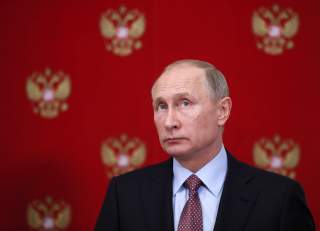The Real Winner in America's Russia Crisis Is China
The continuing American obsession with Russia plays directly into Beijing's hands and makes it less likely that Washington will develop an effective strategy to deal with China.
The current demonization of Russia as a global threat to American interests and values, and of President Putin as the world’s leading arch-villain, can be explained as an extension of the Cold War, of auto-piloting a foreign-policy paradigm that Republicans and Democrats feel comfortable with. But that is intellectually dishonest, considering American partnerships with mass-murderers like Stalin and Mao, and runs contrary to U.S. interests.
First, the preoccupation with the alleged Russian threat makes it impossible to cooperate with Moscow in dealing with common interests in the Middle East and elsewhere, which was President Trump’s goal in reaching out to Moscow, hoping to work out a deal to end the civil war in Syria and reduce the costs of American intervention in the Middle East.
Moreover, the long-term challenge to U.S. global military and economic power is China, and not that second-rate power, Russia.
The continuing American obsession with Russia, like the never-ending military interventions in the Middle East, plays directly into Chinese hands and makes it less likely that Washington would be able to develop an effective strategy to deal with China, including through ad-hoc cooperation with Moscow.
Instead, keeping the Russia collusion story would only encourage China and Russia to further collaborate over and target U.S. interests. And unlike my receding hairline, that isn’t a funny joke.
Leon Hadar is a senior analyst with Wikistrat, a geostrategic consulting firm and author of Sandstorm: Policy Failure in the Middle East.
Image: Reuters
Recommended:
Why North Korea's Air Force is Total Junk

